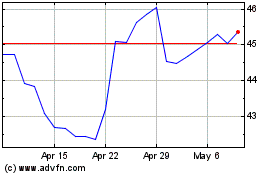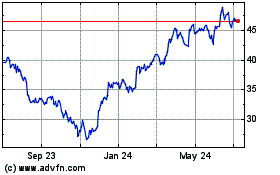By Trefor Moss
This article is being republished as part of our daily
reproduction of WSJ.com articles that also appeared in the U.S.
print edition of The Wall Street Journal (July 11, 2019).
SHANGHAI -- Major car makers are struggling in China as a
slowing economy depresses sales of new vehicles and prolongs a
yearlong downturn in the world's largest auto market after three
decades of growth.
The Chinese auto market in June slumped for a 12th straight
month as consumers grew tightfisted given the uncertainty around
U.S. trade relations and as dealers flooded car lots with older
models, hoping to sell them ahead of a new emissions rule that took
effect this month.
U.S. auto makers Ford Motor Co., General Motors Co. and Fiat
ChryslerAutomotive NV's Jeep division are among those struggling
the most, all logging their worst first-half results in the country
in several years. Many mainstream brands are now facing a question
-- unthinkable just a year or two ago -- of whether to remain in
China at all, analysts say.
"We've hit a saturation point in China that may be interim, but
maybe sort of the end game," Bank of America analyst John Murphy
said recently.
Auto sales in June fell 9.6% from a year earlier, to 2.06
million vehicles. For the first half, they were off 12% at 12.32
million, the weakest in four years, the government-backed China
Association of Automobile Manufacturers said Wednesday. Sales for
the 12 months through June were down 11%, at 26.29 million
vehicles, the lowest July-June tally since 2015-16.
Softer demand in smaller cities for cars and homes and other
big-ticket items have forced sellers to cut prices, as President
Trump targets the country's exports with tariffs. Prices of
vehicles in June were off 1.6% from a year earlier, following a
1.9% decline for May.
China has become tricky terrain for many global auto makers that
rushed to build up operations there during the boom years. The
country's growing middle class fueled demand for new vehicles,
prompting foreign car manufacturers to spend billions on new
factories and additional dealerships.
But the market, which accounts for one-third of all vehicle
sales globally, has rapidly gone from the industry's most bankable
source of growth to a more challenging prospect as demand for new
cars levels off. More broadly, Chinese consumer demand is
faltering.
The slowdown in China has dented earnings and forced auto
executives to temper their outlooks, and trade tensions are further
clouding expectations.
GM reported a 15% drop in first-half sales to 1.57 million
vehicles, its weakest showing since 2013. A company spokeswoman
blamed China's economic slowdown but said that 20 product launches
in the country this year should help restore growth.
Ford's first-half sales, at 290,321 vehicles, were down 27% from
2018 and half the total for the first half of 2016. Ford, which has
registered eight consecutive quarterly declines in China, said it
is accelerating the redesign of its business there.
Like their U.S. rivals, European players are also facing a
tougher road ahead. Volkswagen AG in May reported a nearly 10% drop
in first-quarter profit that reflected in part a steep decline in
sales in China.
Some Chinese auto makers have also lost ground recently.
Zhejiang Geely Holding Group Co., after sales increases of 63% in
2017 and 20% last year, suffered a first-half decline of 15%, at
651,680 vehicles. The company issued a profit warning on Monday and
slashed its 2019 sales target, citing "continued uncertainties in
China's passenger-vehicle market."
Competition is fiercer than ever, as much-improved Chinese
brands challenge Ford, Hyundai Motor Co., Peugeot SA and other car
manufacturers catering to the mass market. The worsening conditions
have already forced out Japan's Suzuki Motor Corp., which exited
China last year. However, some Japanese brands have fared well.
Honda Motor Co.'s first-half sales rose 22% to 745,409 vehicles,
and Toyota Motor Corp.'s sales were up 12% at 769,800.
Auto analysts had previously expected a rebound in the middle of
2019, but some now say it won't arrive soon.
The automobile manufacturers association in China appealed
Wednesday to Beijing to implement policies to boost consumption.
Help is more likely to come from local authorities, analysts said.
The southern cities of Guangzhou and Shenzhen have said they would
ease restrictions on sales of gasoline-powered cars, curbs intended
to fight pollution and congestion.
Dealers desperate to move inventory -- including older models
that couldn't be sold after July 1 due to new emission standards --
shook a market grappling with weak consumer confidence, said Jing
Yang, director of corporate research at Fitch Ratings. "That caused
some chaotic pricing and an imbalanced supply," she said. "It
confused buyers."
Fitch, which had forecast zero growth in the Chinese auto market
this year, now expects a percentage decline in the low single
digits. Nomura, which had said the market would shrink 5% this
year, now predicts a 6.9% decline.
Some global auto makers have responded to the slump by
redoubling their commitment to China. Despite suffering short-term
losses, they are investing more in new models and in local design
and research centers to ensure they retain their position in the
world's largest auto market.
Most analysts expect a return to growth in 2020 and see
potential for sales to grow at least 20% from their current level
given China's low per-capita car ownership compared with developed
markets. Electric-vehicle sales are a bright spot; they rose 50% in
the first half, to 617,000, or 5% of national sales.
Liyan Qi, Grace Zhu and Lin Zhu in Beijing contributed to this
article.
Write to Trefor Moss at Trefor.Moss@wsj.com
(END) Dow Jones Newswires
July 11, 2019 02:47 ET (06:47 GMT)
Copyright (c) 2019 Dow Jones & Company, Inc.
General Motors (NYSE:GM)
Historical Stock Chart
From Mar 2024 to Apr 2024

General Motors (NYSE:GM)
Historical Stock Chart
From Apr 2023 to Apr 2024
